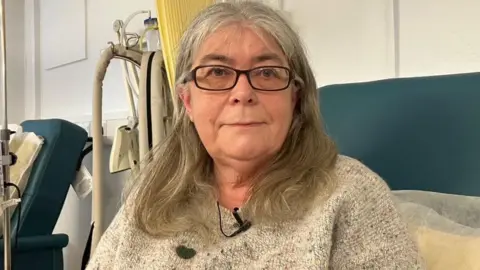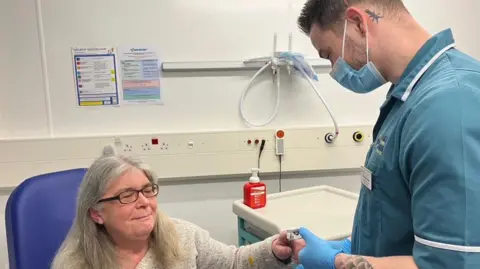'Exciting' cancer vaccine offers hope for patients
 BBC
BBCA cancer patient who has become the first person in Wales to trial a new type of vaccine says she "can't believe how lucky" she is to be part of the research study.
Lesley Jenkins said she had "no symptoms and no idea" when she found out she had stage 2 colorectal cancer in April last year.
The 65-year-old from Cardiff had surgery to remove "a very large tumour" after it was discovered following a routine NHS bowel screening test.
Ms Jenkins "said yes straight away" when offered the vaccine, a clinical trial designed to fight her specific cancer and aimed at preventing it from returning.
Ms Jenkins said that at the time of her diagnosis she was caring for other family members who were unwell, which she believed led her to miss "red flags" of her own condition.
"You don't have time to care about yourself when you're a carer," she said.
"So I missed obvious symptoms, like losing a lot of weight [because] I wasn't eating properly and I was on the go all the time."
After a stool test flagged a potential problem, Ms Jenkins had a colonoscopy which she described as "absolutely fascinating".
"I'm a very strange person. I watched it, because you can. You lie on your side and you can watch it going through your digestive system. That was amazing."
In July, Ms Jenkins had surgery at the University Hospital of Wales' Heath site in Cardiff, to successfully remove the right side of her colon.
But, when she was due to begin treatment the following month, she caught Covid and her mother died - on the floor above her in the same hospital - which caused delays.
She said starting chemotherapy was a "shock", adding: "You see it, you hear about it, but it's so bizarre… your whole body's affected, it knocks the stuffing out of you."
Ms Jenkins' chemotherapy course ended in December, and she began the investigational vaccines trial - sometimes referred to as personalised vaccines - at Velindre Cancer Centre in Cardiff in January.
The study, led by Velindre in partnership with pharmaceutical company BioNTech and Health and Care Research Wales, is looking at whether the vaccines can help train the body's immune system to prevent cancer from returning.
It uses mRNA technology, similar to Covid-19 vaccines, to create a treatment tailored specifically to an individual's particular cancer.
What is a personalised cancer vaccine?
Vaccines are usually designed to prevent disease. But cancer vaccines are created as a treatment once someone has been diagnosed.
Just as with conventional vaccines, they prime the immune system to look for an enemy - in this case the patient's cancer.
The vaccine acts like a "wanted poster" unmasking cancer cells that are adept at hiding in the body, only to resurface later.
The hope is that the vaccine primes the immune system to seek out and destroy any remaining traces of cancer, improving the chances of being cancer-free in years to come.

Prof Rob Jones, associate medical director at Velindre and principal investigator of the trial in Wales, said about 110 Welsh people were set to be enrolled in the study, with 15 other centres in the UK also taking part.
He added cancer vaccine research heralded a "very promising future", adding that it remains unclear how successful it will be.
"But, on paper, it's a very exciting approach."
Ms Jenkins said she thought the research was "brilliant" because it offered the potential of a more tailored approach to treatment - to supplement more traditional treatments including chemotherapy.
"[This trial] is trying to make chemotherapy more efficient, easier for the person who's undergoing it, trying to target an area rather than the whole person."
She added blood samples were used "to teach the rest of the body" and she was monitored closely at every stage of the treatment, something that requires patience.
"It does take a long time, but I can understand the information has got to be as accurate as possible, because they're hoping this goes further.
"I really am delighted I can do it. We've got this place on my doorstep.
"I can't believe how lucky I am."
Jeremy Miles, the Welsh government's cabinet secretary for health, said he wanted Wales to "lead the way in pioneering research that has the potential to improve cancer care and treatment".
